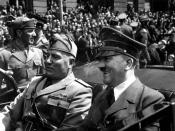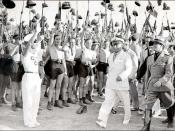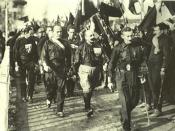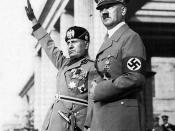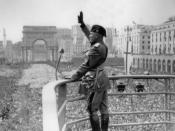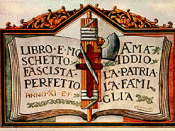By the end of 1919 Europe was in turmoil, World War 1 had finished and the map of Europe had undergone huge changes. Over the next few years many countries would encounter difficulties brought about by the war, some brought about by the peace. It was these difficulties in the post-war period that saw the rise of fascism in many European countries.
Fascism was a form of radical politics that took hold in the early part of the twentieth-century in Europe. Some saw it as a reaction against the profound political and social disorder brought about by World War I. People in Europe were unhappy that their governments could not provide the solutions for the problems left by the war, such as inflation, unemployment and declining social and economic conditions. It was these conditions that led the people of some European countries to look for another solution and they turned to strong, charismatic leaders.
The rise of Fascism after World War 1 started in Italy. Italy had entered World War 1 in 1915 on the side of the allies. They had signed an agreement with France and Britain called the Treaty of London, this would guarantee Italy territory along the Balkan coast and a small part of what was the Austro-Hungarian Empire: if they were to help the allies win the war. However, at the end World War 1 the land Italy had been promised in their deal with the allies did not materialize and Italy left the Paris peace conference in disgust. The people of Italy felt betrayed that the government had not delivered what they had been promised.
Fascism in Italy was a movement that began pre World War I, but did not become a serious political power until Benito Mussolini took control of the Italian government in 1922. Benito Mussolini, who was originally a socialist, founded the `fascio di combattimento' the fascist movement in 1919. In the beginning the movement consisted mostly of ex soldiers who were dissatisfied with their liberal government and the outcome of the war. These ex soldiers, mainly peasants had lost their place in society and found it hard to readjust to civilian life. The allure of the fascist party led by Mussolini and their black shirt uniform gave the ex soldiers a sense of belonging again, similar to what they had previously had in the army. This made the fascist party very popular with returning soldiers.
After the war the ex soldiers returned home to find inflation and unemployment were increasing and there was a deteriorating economic situation, with a national debt of billions of lire. All this coupled with the fact that Italy was notgiven all the land promised to them in The Treaty of London, caused a huge amount of discontent in Italy. During 1919, over 1 million workers took part in strikes and membership of Trade Unions shot up to 2 million. To the ex soldiers the conditions they faced at home seemed a very poor reward for the sacrifices they had made.
However it was not just returning soldiers that began to join the fascist party. With growing unrest throughout Italy and strikes becoming an almost regular event the middle classes began to feel uneasy. They joined the fascist party in their masses, the landowners, white-collar workers, shopkeepers and students. The middle classes where becoming increasingly concerned by the sudden popularity of Socialism among the lower classes, as they campaigned for workers rights and removal of businesses from the owners. They believed the Socialists, inspired by the Russian revolution, were calling for a revolution of some kind within Italy. They were all dissatisfied with the weak Liberal government and the constant threat of the revolution from the unsatisfied working classes; this dissatisfaction just gave even more support to the growing fascist movement.
Mussolini himself began to make the popular promise of restoring Italy to its former glory, and promised a strong leadership. Mussolini was gaining even more support this time from the church, and the police and by late 1921; the Fascist Party had over 200,000 members. The Liberal leaders tried to make deals with Mussolini to bring him into government, but he denied saying that unless he became Prime Minister he would not consider the deal. Mussolini also announced that unless he was made leader he would forcibly seize power. Now that the fascist party had gained such huge strength and popularity Mussolini knew they would be able to.
In 1922, the fascist party planned the take over of local governments and the eventual march on Rome. On October 29, 1922, Mussolini and some 50, 000 black shirts marched on Rome, but rather than this being a violent event it became a symbolic one, as Mussolini had already been asked to form a government. Under Mussolini Italy had became a Totalitarian government where labour unions were abolished and political opponents were killed or silenced. Italy, however, was not the only country to fall under a Fascist regime.
Germany had suffered heavy losses through World War 1 and was forced to accept blame and defeat. With the end of the war, came the end of the German monarchy and a republic was proclaimed. This was known as the Weimar Republic. On June 28, 1919, the German government ratified the Treaty of Versailles. Under the terms of the treaty, Germany had to pay reparations and take responsibility for all civilian damages caused by the war. The German people believed the terms of the treaty were humiliating and extremely unforgiving: especially the war guilt clause.
The economic impact of war was soon being felt across Germany. The loss of the manpower and disruption to trade were all problems for Germany, but then the Treaty of Versailles also took away all German colonies, which were valuable trade routes. Germany had already lost one of it greatest trading partners in Britain, this coupled with the losses of Germanys most valuable industries, the land and mines of Alsace-Lorraine, the Saar region and Upper Silesia. This deprived Germany of 75 per cent iron ore resources, 25 per cent coal resources and 15 per cent arable land. Limits were also placed on German armaments and military strength.
The reparation amount expected to be paid by Germany was set at 'ã11,000 million but was then reduced to ã6000 million in 1921' . Throughout the 1920s the Weimar Republic found it increasingly difficult to pay the agreed reparations. The payment was of cash and goods in kind, however this proved impossible, and by the end of 1921 Germany could not meet its payments. By 1922 the German economy was near to total collapse. What had been high inflation became hyperinflation. This was caused in part by paying for the war effort with more and more paper money. The government did not try to limit the amount of paper money in circulation. This led to the value of the German mark falling from '20 marks per pound' in 1913 to '30 million to the pound' when hyperinflation reached its peak in 1923. The social consequences were dramatic, people's pensions and savings became worthless almost overnight and businesses went bankrupt.
The Franco-Belgian occupation of the Ruhr district took place in January 1923 to take the reparation payments direct, the economic crisis grew. Occupation forces met passive resistance from German workers. However, the decline in production to German industry was much greater cost than paying its annual reparation bill.
The German people protested about the strain on the economy, and lack of help from the German government. They felt let down by the government and began to turn to more radical ideas, this lead to more and more calls from the voters to elect either of the two totalitarian parties, National Socialist or Communist. It could be said, 'the rise of Nazism resulted from the failure of the victors to establish a viable and stable new Europe'.
The Nazi Party was founded in 1919 and for much of the 1920's it was an insignificant party. The party was lead by Adolf Hitler; it had policies including racial extremes, the destruction of the Treaty at Versailles. He blamed the Jewish people for the economic crisis the country was in and encouraged violent strikes against them. During the economic crisis that Germany had found itself in Hitler used his speaking skills to help him gain support for the Nazi party. The German people were already disillusioned with and did not believe or support the German government. They believed Hitler and his party had the answers. Hitler said he could make Germany great again and provide a better life for the German people. This in turn made Hitler and the Nazi party very popular. The support that Hitler gained coupled with the economic problems that Germany faced, was why the government appointed Hitler as chancellor in 1933. Because of the chaos in Germany after the economic depression the government did not know what to do. After the death of Hindenburg its leader in August 1934, Hitler was his automatic successor.
When the economy slowly began to show signs of improving, Hitler took the credit and consolidated his position as a dictator, having succeeded in eliminating challenges from other political parties and government institutions.
Both German fascism, led by Adolf Hitler and Italian fascism, led by Benito Mussolini exploited many economical and political difficulties within their nation in order to gain power. Hitler blamed Germany's ruined economy on the Weimar Republic, Communists, and Jews, while Mussolini blamed large Socialist and Catholic parties for Italy's economic struggles. They also gained the support of farmers, small businessmen, civil servants, and young people by advocating strict nationalistic goals and blaming their economic troubles on the Bolsheviks. Nevertheless, the most crucial components of securing political power was through institutionalized violence and the abolishment of all other political parties.
Britain too saw the rise of fascism, although not to the degree seen in Italy and Germany. In Britain the initial euphoria at being victorious in the war soon dissipated. The returning soldiers soon realised that the promise of Lloyd George 'a fit country for heroes to live in' was not going to materialise. High unemployment and deteriorating social conditions left the demobilised soldier dissatisfied: again they began to look for new solutions for their problems. This coupled with the depression of 1929 left Britain with severe economic problems, the same as in Italy and Germany; perhaps this is why fascism raised its ugly head again this time in Britain.
In 1932,Oswald Mosley who was dubbed the 'British Mussolini' founded the British Union of Fascists and it was strongly anti communist and argued for a programme of economic revival based on more not less government spending. Mosley had fought in World War 1and like many First World War Veterans, he came home disillusioned and believed that there should be no more war, and that the promises that were made to veterans were not fulfilled. He also believed that the mass slaughter, which took place in the trenches, was the responsibility of the establishment. His sympathy for the ordinary man who had fought so bravely in the trenches, concern for social objectives and dismay at governmental waste of money led him increasingly towards Fascism. Historian A.J.P Taylor described Oswald Mosley as, 'The greatest comet of British politics in the twentieth century⦠a superb political thinker, the best of our age'. Nevertheless, it soon became clear that any form of fascism meant racialism and violence in pursuit of national greatness, but Mosley promised that British fascism would 'â¦avoid the darker sides of continental fascism' Initially, the BUF attracted much support and by 1934 had attracted some 40,000 members this including both white and blue-collar workers, and middle class women.
However, elements in the BUF were anti-semitic and it seems that here there were many similarities with the German and Italian counterparts; this in itself began to worry of Mosley's supporters. It could be said that the growing brutality that the German people were beginning to face under its leader Hitler may have discredited any fascist party in Britain. Also the growing violence that was accredited to the BUF in Jewish areas of London soon became a thorn in the side of Mosley and the party support soon began to wane.
The outbreak of World War 11 saw the steady demise of the fascist party in Britain with the country rallied behind its government and the people no longer wanted to be associated with any regime being linked to Hitler.
In the late 1930's, German novelist Thomas Mann described fascism as 'a disease of the times, which is at home everywhere and from which no country is free,' It could be said that Fascism grew in Europe out of peoples discontent political and social conditions in many countries by the end of World War 1, it could also be blamed on the subsequent peace settlements inflicted on others. So it is in this way that we could say that the rise of Fascism is inextricably linked with the First World War.
BibliographyMartin Blinkhorn, Fascism and the Right in Europe 1919-1945(London 2000)Roger Griffin, Nature of Fascism. (London 1993)Ruth Henig. Versailles and After, 1919-33 (London 1995)James Joll, The Origins of the First World War (London, 1984)Norman Lowe, Mastering Modern British History (London 1984)Stanley Payne, A History of Fascism 1914-1945. (London Press Ltd 1997)Stanley Payne, Fascism (Wisconsin 1980)Robert Pearce, Contemporary Britain 1914-1979. (London 1997)Richard Thurlow, Fascism. (Cambridge 1999).
http://www.oswaldmosley.com
